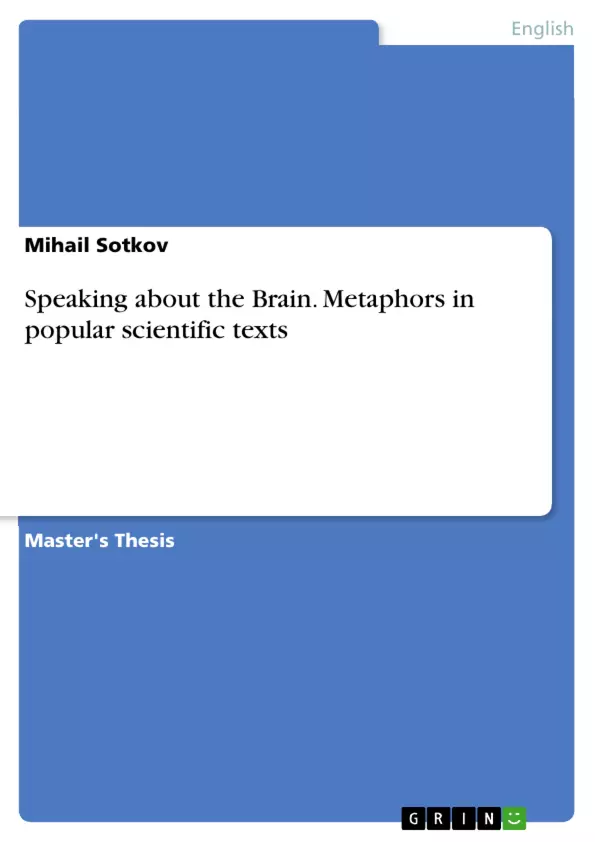
Speaking about the Brain. Metaphors in popular scientific texts
Masterarbeit, 2014
131 Seiten, Note: 1,3
Leseprobe
Inhaltsverzeichnis (Table of Contents)
- Introduction
- Popular scientific texts and Metaphors
- The role of Metaphors
- A short diachronic overview of brain Metaphors
- Linguistic Framework
- Cognitive Linguistics
- Conceptual Metaphor Theory
- Primary Metaphor Theory
- Blending Theory
- What makes a blend metaphoric
- Wrap-up: Comparison between CMT and BT
- Metaphor Identification Procedure
- The Corpus
- Linguistic analyses of popular scientific Texts
- Category Personification
- Category Machines
- Category Space
- Category Mystery
- Category Nature
- Category Business
- Category Chaos
Zielsetzung und Themenschwerpunkte (Objectives and Key Themes)
This thesis aims to analyze the use of metaphors in popular scientific texts about the human brain. The research explores how metaphors are employed, why they are used when discussing the brain, and what specific types of metaphors are prevalent. The study aims to illuminate the cognitive processes that underlie the construction of meaning, specifically those triggered by metaphorical language.
- The role of metaphors in shaping our understanding of the brain.
- The cognitive processes involved in understanding metaphors in popular scientific texts.
- An analysis of the types of metaphors used to describe the human brain.
- The impact of metaphors on the conceptualization of the human brain.
- The relationship between language and thought in the context of brain science.
Zusammenfassung der Kapitel (Chapter Summaries)
The introduction sets the stage for the analysis by exploring the relationship between language, thought, and the understanding of the human brain. It highlights the role of metaphors and raises the questions about how metaphors influence our understanding of this complex organ. The chapter also provides a brief overview of the philosophical approaches to the conceptualization of the brain and introduces the linguistic tools used for analysis.
The second chapter delves into the significance of metaphors in popular scientific texts, examining their role in conveying complex ideas and influencing our understanding. This chapter also explores the historical development of brain metaphors and their evolution over time.
The third chapter presents the linguistic framework for analyzing the corpus of popular scientific texts. It introduces key concepts from cognitive linguistics, specifically Conceptual Metaphor Theory, Primary Metaphor Theory, and Blending Theory, providing a comprehensive overview of these theoretical frameworks.
The chapter on the corpus offers a detailed description of the collection of texts used in the analysis, highlighting the specific characteristics and selection criteria employed.
The fifth chapter presents the results of the linguistic analysis of the corpus, examining the different categories of metaphors used in the texts. The chapter analyzes specific categories of metaphors, such as Personification, Machines, Space, Mystery, Nature, Business, and Chaos, shedding light on the various ways in which the human brain is conceptualized within popular scientific texts.
Schlüsselwörter (Keywords)
The main keywords and focus topics of this work include: popular scientific texts, metaphors, cognitive linguistics, Conceptual Metaphor Theory, Blending Theory, human brain, conceptualization, meaning construction, linguistic analysis, category analysis.
Frequently Asked Questions
What are brain metaphors?
Brain metaphors are linguistic tools used in popular science to describe the complex functions of the human brain by comparing it to more familiar concepts like machines or computers.
What is Blending Theory?
Blending Theory (Conceptual Integration) explains how we create new meanings by mentally integrating different conceptual domains, such as "brain" and "computer."
Why does popular science use metaphors?
Metaphors help bridge the gap between complex scientific findings and the general public's understanding by using relatable analogies.
What are common categories of brain metaphors?
Common categories include Personification, Machines (the brain as a hard drive), Space, Nature, and even Business or Chaos.
How do metaphors shape our view of human nature?
By predominantly using machine metaphors, we tend to conceptualize human nature in terms of efficiency, processing, and technical input/output.
Details
- Titel
- Speaking about the Brain. Metaphors in popular scientific texts
- Hochschule
- Technische Universität Dortmund (Institut für Anglistik und Amerikanistik)
- Note
- 1,3
- Autor
- Mihail Sotkov (Autor:in)
- Erscheinungsjahr
- 2014
- Seiten
- 131
- Katalognummer
- V305477
- ISBN (eBook)
- 9783668035102
- ISBN (Buch)
- 9783668035119
- Dateigröße
- 918 KB
- Sprache
- Englisch
- Schlagworte
- speaking brain metaphors
- Produktsicherheit
- GRIN Publishing GmbH
- Preis (Ebook)
- US$ 39,99
- Preis (Book)
- US$ 50,99
- Arbeit zitieren
- Mihail Sotkov (Autor:in), 2014, Speaking about the Brain. Metaphors in popular scientific texts, München, Page::Imprint:: GRINVerlagOHG, https://www.diplomarbeiten24.de/document/305477
- Autor werden
- Ihre Optionen
- Vertriebskanäle
- Premium Services
- Autorenprofil
- Textarten und Formate
- Services für Verlage, Hochschulen, Unternehmen

- © GRIN Publishing GmbH.
- Alle Inhalte urheberrechtlich geschützt. Kopieren und verbreiten untersagt.
- info@grin.com
- AGB
- Open Publishing
Der GRIN Verlag hat sich seit 1998 auf die Veröffentlichung akademischer eBooks und Bücher spezialisiert. Der GRIN Verlag steht damit als erstes Unternehmen für User Generated Quality Content. Die Verlagsseiten GRIN.com, Hausarbeiten.de und Diplomarbeiten24 bieten für Hochschullehrer, Absolventen und Studenten die ideale Plattform, wissenschaftliche Texte wie Hausarbeiten, Referate, Bachelorarbeiten, Masterarbeiten, Diplomarbeiten, Dissertationen und wissenschaftliche Aufsätze einem breiten Publikum zu präsentieren.
Kostenfreie Veröffentlichung: Hausarbeit, Bachelorarbeit, Diplomarbeit, Dissertation, Masterarbeit, Interpretation oder Referat jetzt veröffentlichen!
- GRIN Verlag GmbH
-
- Nymphenburger Str. 86
- 80636
- Munich, Deutschland
- +49 89-550559-0
- +49 89-550559-10
- info@grin.com
-









